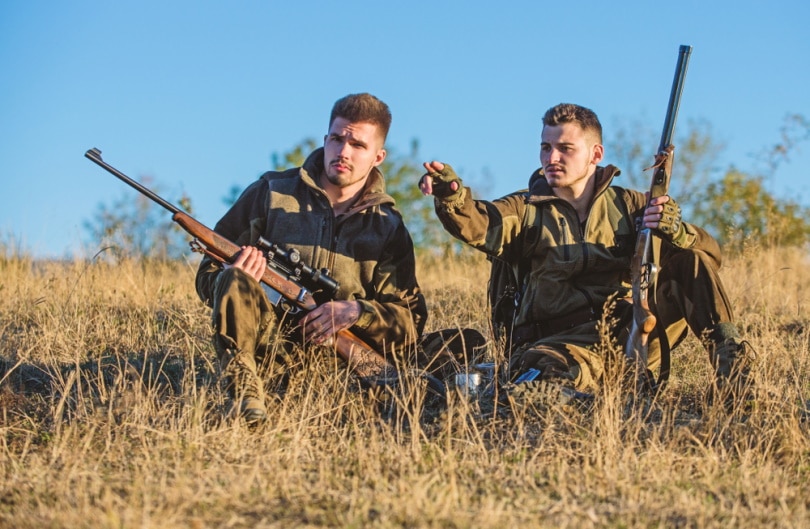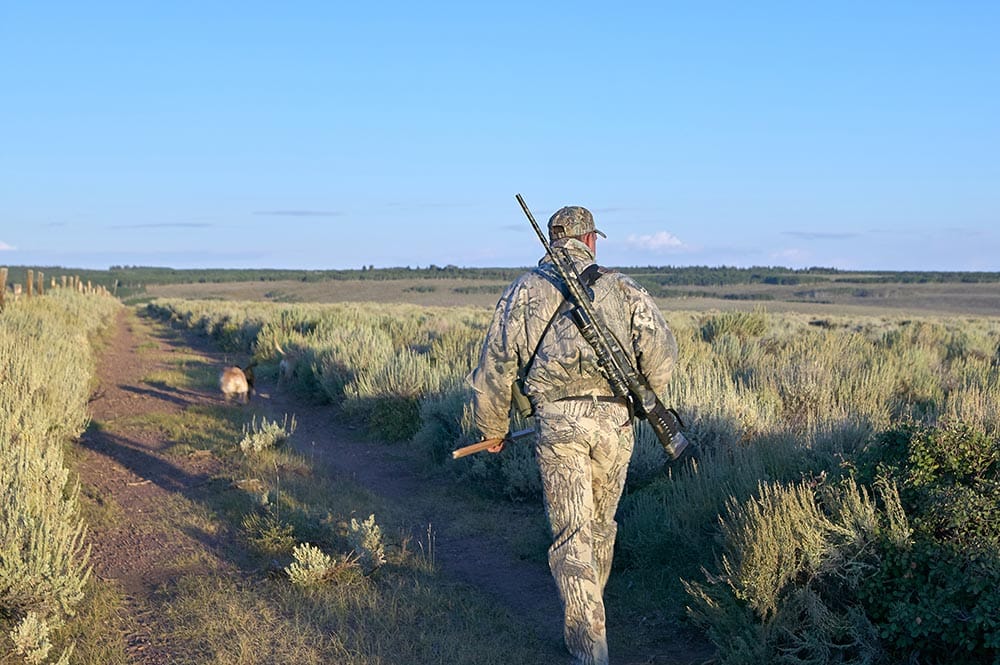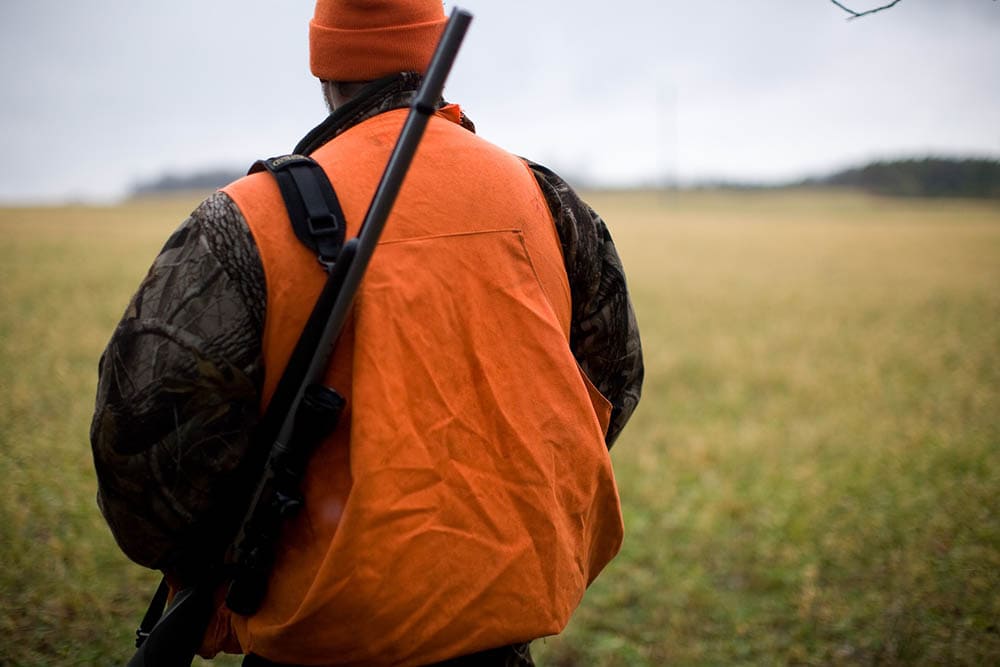Can I Hunt On My Own Land Without A License? Important Facts
Last Updated on

Every state (with Washington D.C. being an exception) has unique hunting regulations set by the local Department of Wildlife and Fisheries. Generally, it is illegal to hunt without a license. Those interested in hunting within the state’s boundaries can obtain proper permits from local retail outlets dealing with fishing and hunting equipment.
Whether you’ll also need a permit to hunt on your own land will depend on your targeted game. Most states don’t require you to have a license to hunt small animals like squirrels and rabbits that wander into your property. However, you may still need a permit to legally pursue bigger games like bear, elk, and deer.

Facts About Hunting on Private Land
The U.S. has millions of acres of privately owned property, including farms and ranches. While these properties may receive wildlife traffic from deer, antelopes, elks, etc., there are state laws and regulations that protect these animals.
Hunting regulations differ from state to state. However, most states provide limited licenses for hunting big games. You can also apply for a private-land-only license at least two weeks before a hunt to enjoy special hunting permission as a landowner. Generally, hunting licenses dictate the specific areas and seasons when you can hunt particular animals.
Landowners generally enjoy preference when obtaining hunting licenses. The general rule is that hunters cannot pursue wounded wildlife on a privately owned property unless they get permission from the landowner. Even if you have a license, hunting or capturing a protected species is a crime punishable by a jail sentence, fines, and the loss of hunting privileges.

How to Hunt on Private Land Legally
Wildlife is a renewable natural resource, and hunters help in wildlife conservation. Because wildlife is in surplus, hunting creates a healthy balance in the ecosystem. Licensing helps in generating funds that can be used to save dwindling wildlife populations. It also helps regulate hunting and ensure the nation does not end up with endangered species.
License distribution happens at a state level. Each state has unique requirements residents must meet to obtain permits for hunting on private land. One common requirement is that hunters can only employ reasonable means to capture wildlife. Most states prohibit using cars, aircraft, edible waste, and poisons when hunting.
Can I Hunt on Public Lands Without a License?
Whether a beginner or avid hunter, hunting on public lands offers an unparalleled experience. America has a deep hunting heritage, and many families are keen to pass the hunting tradition down the line. For this year alone, the country issued approximately 39 million hunting licenses, permits, tags, and stamps.
The best hunting states include Alaska, Colorado, Montana, Arizona, New Mexico, Kansas, South Dakota, Wisconsin, Texas, and Louisiana. Alaska remains one of the best destinations for hunting “quality” games, including feral hogs, deer, and waterfowl.
So, is it legal to hunt on public lands without a license?
No. You need a state-issued license to hunt on public lands. The type of hunting license you need will depend on your age, where, when, and what you want to hunt.

How to Obtain a Hunting License
Your state’s fish and game department sets the regulations you must abide by to engage in legal hunting. Generally, you need a license to hunt big games on public or private property.
Here are the general steps for obtaining a hunting license:
1. Acquaint Yourself with Your State’s Unique Hunting Requirements
Hunting is regulated on a state-by-state basis. Before applying for your license, learn about the unique hunting laws and requirements of your state or desired hunting location. Most states demand that hunters undergo a “Hunter’s Education Course” to learn how to maintain personal and public safety when hunting.
In most states, the minimum age limit is 12, although states like Texas allow solo hunting for kids above the age of 9. On the other hand, there’s no minimum age for hunting alone in Vermont, New Mexico, Alabama, Indiana, Oklahoma, and Arkansas as long as a licensed adult supervises underage hunters. Hunters that use firearms must also ascertain that they have proper firearms permits.
2. Decide on Your Hunting Location and Season
Some states have hunting seasons that make it illegal to hunt specific games past a specified time frame without a special permit. Furthermore, hunting could be limited to distinct zones or locations, especially when targeting big games like deer and elk.
Your hunting location, preferred season, and method of take (hunting style) can play a significant role in dictating the ideal type of hunting license. Generally, crossbow and rifle hunters have different hunting seasons and permits. Some states also set the number of animals you can kill and will require you to tag and report each kill.
3. Apply for a Hunting License
It is essential to have all your hunting details handy such as what you want to hunt, when, where, and using which method of take. If you desire to hunt on private land you own, most states require you to apply for a private-land-only license as long as you are a resident. Non-residents who own land in the state and plan to hunt should apply for a non-resident hunting license.
Other paperwork you need includes your Social Security Number or Identification, Hunter Education Course card, and firearm license. While most states allow online applications, you must print out your receipt.

Bottom Line
Since the 19th century, hunters have continuously played a significant role in conserving the nation’s wildlife resources. Hunting in America is a cultural practice that has, over the years, helped in shaping wildlife management philosophies through respecting nature and maintaining ethical hunting traditions.
Each state has unique hunting regulations, including laws that govern the hunting season for different wildlife species. Depending on the animal you target, obtaining special or additional licenses, stamps, tags, or permits may even be necessary. Furthermore, state laws change frequently, making it crucial to consult with a hunting law attorney if you are unsure about your state’s most current regulations.
Featured Image Credit: Just dance, Shutterstock
Table of Contents
About the Author Robert Sparks
Robert’s obsession with all things optical started early in life, when his optician father would bring home prototypes for Robert to play with. Nowadays, Robert is dedicated to helping others find the right optics for their needs. His hobbies include astronomy, astrophysics, and model building. Originally from Newark, NJ, he resides in Santa Fe, New Mexico, where the nighttime skies are filled with glittering stars.
Related Articles:
How to Collimate Binoculars: 9 Expert Tips
Binocular Magnification Chart: Numbers & Distances Compared
How to Clean a Refractor Telescope: Step-by-Step Guide
How to Clean a Telescope Eyepiece: Step-by-Step Guide
What Is the Best Binocular Magnification for Hunting? Optical Features Explained
How to Clean a Rifle Scope: 8 Expert Tips
When Were Binoculars Invented? History, Today & Future
Monocular vs Telescope: Differences Explained (With Pictures)
